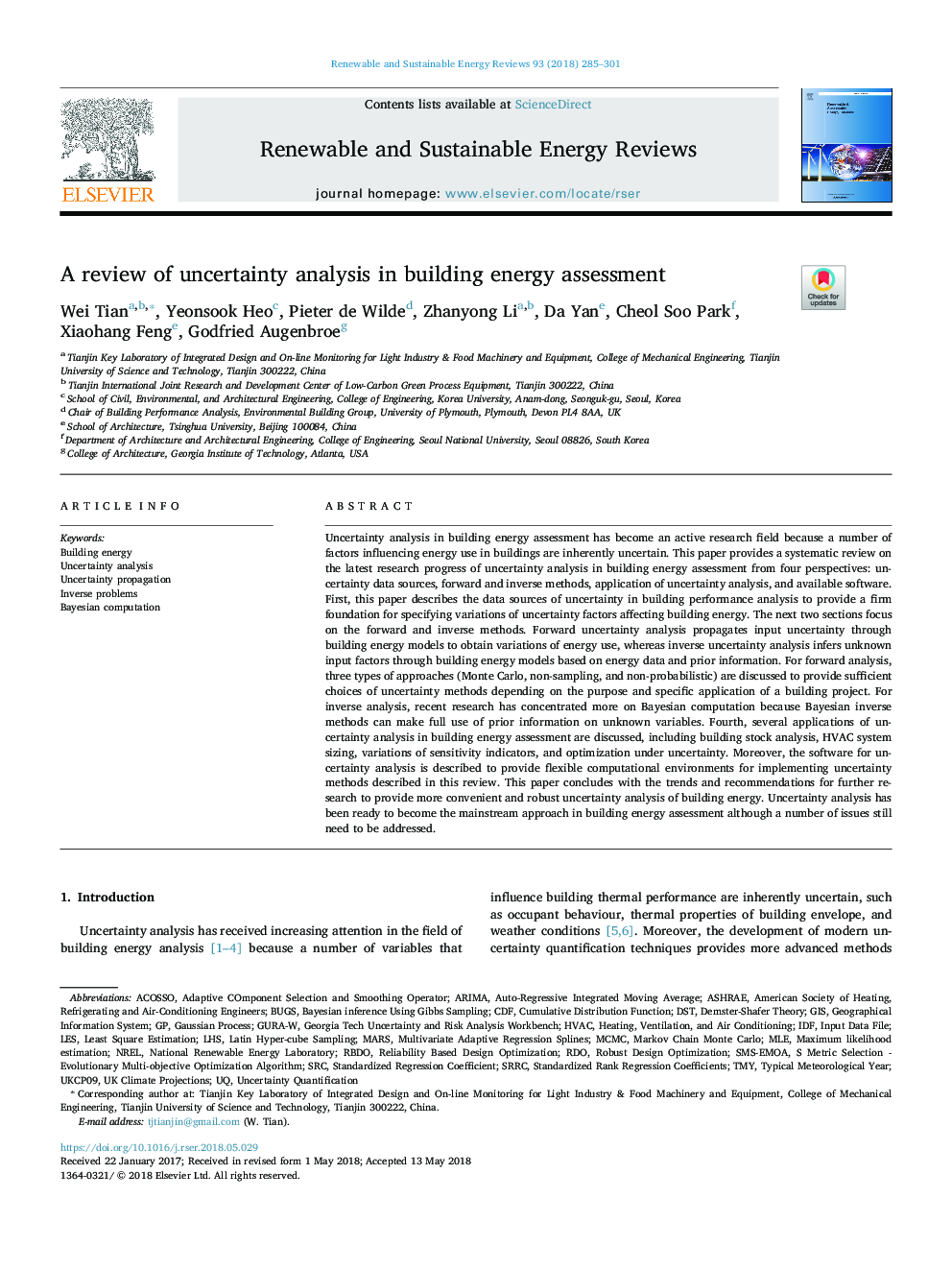| کد مقاله | کد نشریه | سال انتشار | مقاله انگلیسی | نسخه تمام متن |
|---|---|---|---|---|
| 8110700 | 1522291 | 2018 | 17 صفحه PDF | دانلود رایگان |
عنوان انگلیسی مقاله ISI
A review of uncertainty analysis in building energy assessment
ترجمه فارسی عنوان
بررسی تحلیلی عدم قطعیت در ارزیابی انرژی ساختمان
دانلود مقاله + سفارش ترجمه
دانلود مقاله ISI انگلیسی
رایگان برای ایرانیان
کلمات کلیدی
UKCP09SRRCMCMCRDONRELRBDOTMYDSTSRCMLEARIMALHSIDFLESASHRAECDFNational Renewable Energy Laboratory - آزمایشگاه ملی انرژی تجدید پذیرBugs - اشکالاتUncertainty propagation - انتشار عدم اطمینانAmerican Society of Heating, Refrigerating and Air-conditioning Engineers - انجمن مهندسین گرمایش، تهویه مطبوع و تهویه مطبوع آمریکاBuilding energy - انرژی ساختمانLeast square estimation - برآورد حداقل مربعMaximum likelihood estimation - برآورد درستنمایی بیشینه یا برآورد حداکثر احتمالRobust Design Optimization - بهینه سازی طراحی قویReliability based design optimization - بهینه سازی طراحی مبتنی بر قابلیت اطمینانCumulative Distribution Function - تابع توزیع تجمعیUncertainty analysis - تجزیه و تحلیل عدم قطعیتMultivariate adaptive regression splines - تنوع رگرسیون چند متغیره انطباقیHVAC - تهویه مطبوعMarkov chain Monte Carlo - زنجیره مارکف مونت کارلوTypical meteorological year - سالانه هواشناسی معمولیGIS - سامانه اطلاعات جغرافیاییMars - سیاره مریخgeographical information system - سیستم اطلاعات جغرافیاییGaussian process - فرآیند گاوسیBayesian computation - محاسبات بیزیInverse problems - مسایل معکوسAuto-regressive integrated moving average - میانگین متحرک متحرک خودکار رگرسیونUncertainty quantification - کمی سازی عدم قطعیتheating, ventilation, and air conditioning - گرمایش، تهویه و تهویه مطبوع
ترجمه چکیده
تجزیه و تحلیل عدم قطعیت در ارزیابی انرژی ساختمان تبدیل شده است به یک زمینه تحقیق فعال، زیرا تعدادی از عوامل موثر بر استفاده از انرژی در ساختمان به طور ذاتی نامشخص است. این مقاله یک بررسی سیستماتیک در مورد آخرین پیشرفت های تحقیق تحلیلی عدم قطعیت در ارزیابی انرژی ارزیابی از چهار دیدگاه ارائه می دهد: منابع داده های عدم اطمینان، روش های پیشین و معکوس، استفاده از تحلیل عدم قطعیت و نرم افزار موجود. اول، این مقاله منابع داده های عدم قطعیت را در تجزیه و تحلیل عملکرد ساختمان توضیح می دهد تا پایه ای قوی برای تعیین تغییرات عوامل نااطمینی در انرژی ساختمان ایجاد کند. دو بخش بعدی بر روی روشهای پیشین و معکوس متمرکز هستند. تجزیه و تحلیل عدم قطعیت به جلو، عدم قطعیت ورودی را از طریق ایجاد مدل های انرژی برای به دست آوردن تغییرات استفاده از انرژی منتشر می کند، در حالی که تحلیل غیرقابل اطمینان معکوس از طریق مدل های انرژی بر اساس داده های انرژی و اطلاعات پیشین، عوامل نامشخص نامیده می شود. برای تحلیل پیشین، سه نوع روش (مونت کارلو، غیر نمونه برداری و غیر احتمالی) برای انتخاب گزینه های مناسب روش های عدم قطعیت بسته به هدف و کاربرد خاص یک پروژه ساختمان مورد بحث قرار می گیرد. برای تحلیل معکوس، تحقیقات اخیر بیشتر بر محاسبات بیزی متمرکز شده است؛ زیرا روش های معکوس بیزی میتواند از اطلاعات پیشین در متغیرهای ناشناخته کامل استفاده کند. چهارم، کاربرد چندانی از تحلیل عدم قطعیت در ارزیابی انرژی ساختمان، از جمله تجزیه و تحلیل سهام ساختمان، اندازه گیری سیستم های تهویه مطبوع، تغییرات شاخص های حساسیت و بهینه سازی در شرایط عدم اطمینان مورد بحث قرار گرفته است. علاوه بر این، نرم افزار برای تجزیه و تحلیل عدم قطعیت توصیف شده است برای ارائه محاسبات محاسباتی انعطاف پذیر برای اجرای روش های عدم قطعیت توصیف شده در این بررسی. این مقاله با روند و توصیه هایی برای تحقیقات بیشتر به منظور ارائه تحلیل دقیق تر و غیرمترقبه انرژی ساختمان، نتیجه می گیرد. تجزیه و تحلیل عدم قطعیت آماده شده است تا رویکرد اصلی در ایجاد ارزیابی انرژی شود، هرچند تعدادی از مسائل هنوز باید مورد توجه قرار گیرد.
موضوعات مرتبط
مهندسی و علوم پایه
مهندسی انرژی
انرژی های تجدید پذیر، توسعه پایدار و محیط زیست
چکیده انگلیسی
Uncertainty analysis in building energy assessment has become an active research field because a number of factors influencing energy use in buildings are inherently uncertain. This paper provides a systematic review on the latest research progress of uncertainty analysis in building energy assessment from four perspectives: uncertainty data sources, forward and inverse methods, application of uncertainty analysis, and available software. First, this paper describes the data sources of uncertainty in building performance analysis to provide a firm foundation for specifying variations of uncertainty factors affecting building energy. The next two sections focus on the forward and inverse methods. Forward uncertainty analysis propagates input uncertainty through building energy models to obtain variations of energy use, whereas inverse uncertainty analysis infers unknown input factors through building energy models based on energy data and prior information. For forward analysis, three types of approaches (Monte Carlo, non-sampling, and non-probabilistic) are discussed to provide sufficient choices of uncertainty methods depending on the purpose and specific application of a building project. For inverse analysis, recent research has concentrated more on Bayesian computation because Bayesian inverse methods can make full use of prior information on unknown variables. Fourth, several applications of uncertainty analysis in building energy assessment are discussed, including building stock analysis, HVAC system sizing, variations of sensitivity indicators, and optimization under uncertainty. Moreover, the software for uncertainty analysis is described to provide flexible computational environments for implementing uncertainty methods described in this review. This paper concludes with the trends and recommendations for further research to provide more convenient and robust uncertainty analysis of building energy. Uncertainty analysis has been ready to become the mainstream approach in building energy assessment although a number of issues still need to be addressed.
ناشر
Database: Elsevier - ScienceDirect (ساینس دایرکت)
Journal: Renewable and Sustainable Energy Reviews - Volume 93, October 2018, Pages 285-301
Journal: Renewable and Sustainable Energy Reviews - Volume 93, October 2018, Pages 285-301
نویسندگان
Wei Tian, Yeonsook Heo, Pieter de Wilde, Zhanyong Li, Da Yan, Cheol Soo Park, Xiaohang Feng, Godfried Augenbroe,
